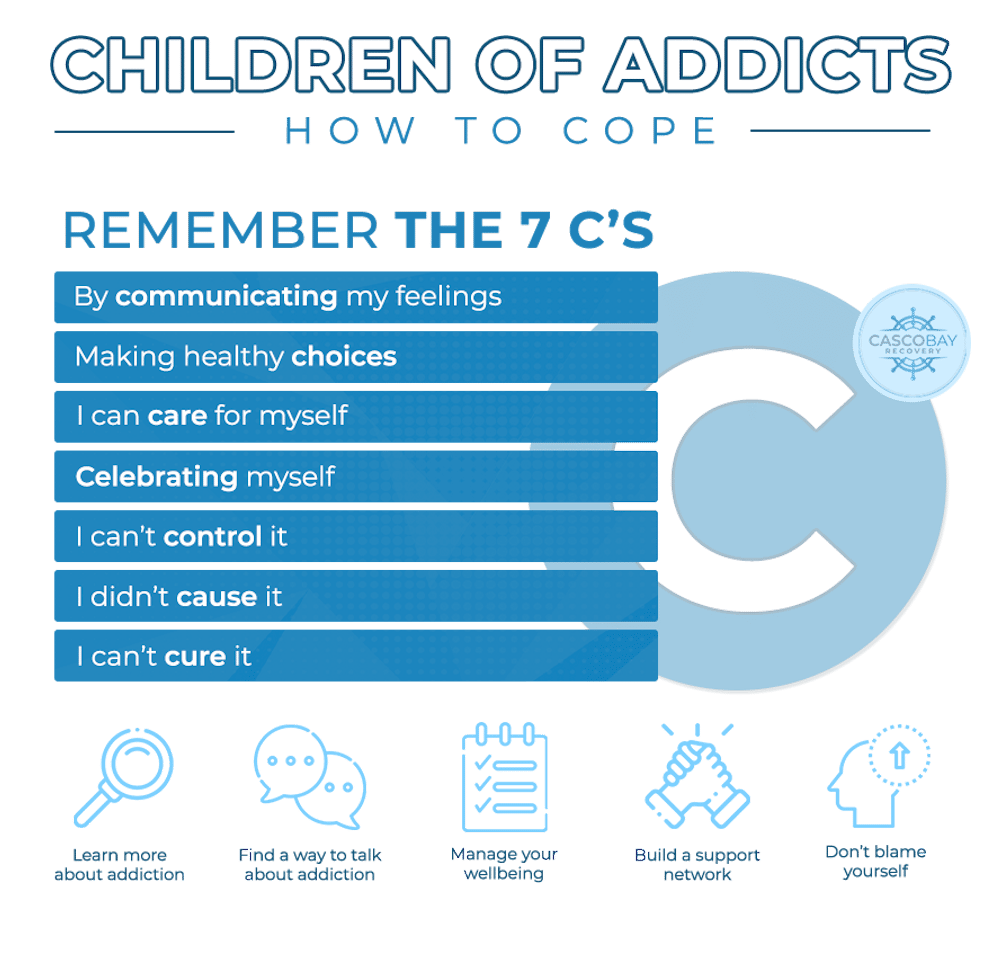 The National Institute on Drug Abuse estimates that 25 percent of kids in the United States live in homes where they will witness substance abuse problems. According to the National Institutes of Health, when a child grows up in a home with one or more addicted parents, he or she is twice as likely to abuse substances as well.
The National Institute on Drug Abuse estimates that 25 percent of kids in the United States live in homes where they will witness substance abuse problems. According to the National Institutes of Health, when a child grows up in a home with one or more addicted parents, he or she is twice as likely to abuse substances as well.
For children of addicts, watching a parent suffer from addiction can be a difficult and harrowing experience. Not only are children of addicts dealing with the challenges of adolescence, but they also have to witness their parents struggling with substance use disorders. It can be hard to know how to cope with such a situation, but there are some things that children of addicts can do to help themselves.
It’s also important to remember that children of addicts can have a positive influence on their parents’ substance issues by encouraging them to seek treatment resources. Learn more about the variety of options and support services available to help. Remember, you are not alone in this and there are people who can offer support. Don’t be afraid to seek professional help if you are struggling to cope with your substance addiction and/or addiction triggers.
The Substance Abuse Problem in the United States
According to the Mental Health Services Administration, around 20 million people in the United States suffer from some form of substance abuse. This number has been rising steadily over the past few years, and it shows no signs of slowing down. Drug addiction is a serious problem in this country, and it takes a toll on people of all ages.
In 2020, nearly 92,000 people died from drug overdoses, and many more struggled with addiction without ever seeking treatment. The Mental Health Services Administration conducted a survey and found that only around 10% of people with substance abuse disorders receive any kind of treatment. This is an alarming statistic, as it suggests that the majority of people who need help are not getting it.
There are many reasons why someone might not seek treatment for addiction, but one of the most common is lack of access to mental illness and addiction services. Addiction is a complex disease, and it requires professional help to overcome.
How to Cope When Your Parent is an Addict
Finding ways to cope with alcoholic parents does not mean that you’ll simply just learn to deal with the situation. You’ll also find ways to help discuss treatment options with your parents to hopefully break the same pattern of substance use.
Children of addicts typically struggle with how to handle their parent’s substance use disorders. The most important thing to remember is that your parent with an addiction is not a bad person. It’s understandable if you are angry or confused about the situation. In general, though, when it comes to addiction focus on “The Seven C’s.”

The Seven C’s
- I didn’t cause it
- I can’t cure it
- I can’t control it
- I can care for myself
- By communicating my feelings
- Making healthy choices
- Celebrating myself
Learn More About Addiction
First, it’s important to understand that addiction is a disease and that your parent is not making a choice to engage in drug abuse. Like any disease, addiction requires a treatment plan and regular maintenance. Substance abuse treatment is necessary to help parents recover from alcohol abuse or drug addiction.
While it may not be your parent’s fault for becoming addicted to substances, it is his or her responsibility to get treatment. It may feel scary to ask your parents to seek treatment, but it might help your parent see how alcohol or drug use has gotten out of control.
Build a Support Network
Second, you should try to build a support network of friends or family members who can offer you an outlet for your feelings. Young people who are dealing with addicted parents are often discouraged from seeking support groups or discussing their addicted parents with others. However, looking for resources and people you can trust will help provide support when you need it most.
Don’t Place Blame on Yourself
Addiction is a disease. When addiction occurs it’s not anyone’s fault and does not make your parent a bad person. Regardless of your own feelings on the situation, you didn’t cause the drug abuse problems, even if your parents may have stated otherwise. Substance use disorders develop regardless of an individual’s age, gender, race, or socioeconomic status.
Find a Way to Talk About Addiction in the House
Find ways to discuss substance use disorders with your family members and your parents. Addiction affects the entire family, and more than likely you have questions about your parent’s alcohol or drug use. As children of alcoholics, it can feel awkward to speak up or ask about substance use disorders, but it may help your parents understand their impact better.
Manage Your Own Well Being
Find healthy ways to feel good about yourself. Participate in fun activities, visit friends and family members that are outside of the home, or even start a new hobby. Get involved with new sports teams or clubs at your school. The overall goal is to boost your self-esteem and enjoy a more normal behavior.
The Challenges of Growing up with an Addicted Parent
Children of addicts often suffer from a range of emotional and behavioral problems. Not to mention the chaos that can typically develop when people in a household are suffering from addiction. It can be difficult for children of addicts to cope with their parent’s disease.
Children of addicts are more likely to experience:
- A larger chance of developing drug or alcohol abuse
- More likely to begin experimenting with drugs or alcohol
- Behavioral and emotional issues
- Difficulty with low self-esteem
- At greater risk for sexual abuse or physical abuse
- More likely to develop a mental illness like depression
- A greater chance of having a traumatic childhood experience
- Overall more opportunities for adverse childhood experiences
There are some things that can help. It is important to talk to someone who understands what you’re going through. This could be a counselor, therapist, or attending support groups. It is also important to take care of yourself. Make sure you get enough sleep, exercise, and eat a healthy diet. Taking care of yourself will help you to better cope with your parent’s addiction.
How Addiction Changes a Parent’s Role
 The National Institute on Drug Abuse reports that drug addiction can have a profound effect on the entire family. One way in which addiction can change family dynamics is by reversing the roles of parent and child. In a traditional family, parents provide care and support for their children. However, when a parent is struggling with addiction, the child may need to step up and provide care for the parent. This can include tasks such as cooking meals, cleaning the house, and providing emotional support. Sometimes the level of these intimate relationships goes beyond what is considered healthy for children to experience.
The National Institute on Drug Abuse reports that drug addiction can have a profound effect on the entire family. One way in which addiction can change family dynamics is by reversing the roles of parent and child. In a traditional family, parents provide care and support for their children. However, when a parent is struggling with addiction, the child may need to step up and provide care for the parent. This can include tasks such as cooking meals, cleaning the house, and providing emotional support. Sometimes the level of these intimate relationships goes beyond what is considered healthy for children to experience.
As a result of this reversal of roles, children can often feel overwhelmed and stressed. They may also struggle with feelings of guilt or shame.
Examples of Emotional Support That are Considered Excessive:
- Feeling responsible for a parent’s substance abuse because the parent blames the child for being “too much stress”
- Making excuses or covering up for a parent not going to work or neglecting other obligations and being forced to speak with their boss or other authority figures
- Drinking with an alcoholic parent in order to find a way to bond
- Listening to an addicted parent tell explicit stories about when he or she was engaging in substance abuse
- Being forced to drive a parent home from somewhere because he or she is too intoxicated, regardless of whether the child has a license or not
- Not going out with friends because they feel guilty that their parents are at higher risk to engage in destructive substance abuse if they are gone.
The mental stress associated with having to take care of an addicted person on top of maintaining one’s own well-being can actually harm the development of a child’s brain. Also, children who are forced to take care of themselves because their parents are unavailable are at a higher risk of experiencing injuries, crimes, malnutrition, and isolation from peers. Children of addicts may feel too ashamed to bring any friends to their homes. Ultimately, it leads to the inability to develop relationships with other kids.
The most upsetting part is that many children of addicts believe that the parents’ addictions are caused by them and that they are at fault. What if the child of an addict listened better? What if a child of an addict were performing better in school? Or if a child of an addict was able to take care of more household responsibilities. Would that child’s parents no longer be engaging in substance abuse? Regardless, children of addicts should find ways to take care of themselves first and find support.
Casco Bay is Here to Help
If you have a parent that is currently suffering from addiction, Casco Bay can help. We offer a variety of outpatient rehab options to help them recover. Each outpatient program is designed to target the areas of a person’s life where addiction has caused stress and dysfunction. We utilize family therapy as part of our treatment approach to allow family members the ability to heal along with the addicted parent. At Casco Bay, we focus on healing the whole family.
Overcoming addiction is difficult, but with Casco Bay, we can find the approach that works best for you or your loved one. To learn more about our various options for outpatient rehab, please contact us today.
References:
https://www.ncbi.nlm.nih.gov/pmc/articles/PMC3676900/
https://teens.drugabuse.gov/blog/post/helping-children-addicted-parents-find-help

